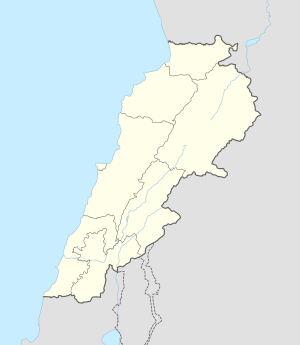Arsal
|
Arsal Aarsal, Ersal 'Irsal |
|
|---|---|
| Town and Municipality | |
| Location in Lebanon | |
| Coordinates: 34°10′46″N 36°25′15″E / 34.17944°N 36.42083°ECoordinates: 34°10′46″N 36°25′15″E / 34.17944°N 36.42083°E | |
| Country |
|
| Governorate | Beqaa Governorate |
| District | Baalbek District |
| Area | |
| • Total | 122.37 sq mi (316.94 km2) |
| Elevation | 5,090 ft (1,550 m) |
| Population Estimate | |
| • Total | 10,000 |
| Alternate name | Ain Chaub |
|---|---|
| Location | 3 km (1.9 mi) east of Labweh |
| Type | Rock shelter |
| History | |
| Cultures | Natufian |
| Site notes | |
| Excavation dates | 1970, 1976 |
| Archaeologists | Bruce Schroeder |
| Public access | Yes |
Arsal (also spelled Aarsal, Ersal or 'Irsal; Arabic: عرسال), is a town and municipality situated east of Labweh, 124 kilometres (77 mi) north east of Beirut, in the Baalbek District of the Beqaa Governorate in Lebanon. The population is predominantly Sunni Muslim.
It is a traditional town situated on the slopes of the Anti-Lebanon mountains. It is known for its local hand-made carpet industry. The area is known to be one of the few places in the Anti-Lebanon with a good water supply. The Lebanese Ministry of Tourism brochure suggests that the name Arsal or Ersal means "God's Throne" in Aramaic. It documents several rock-cut benches (mastabas) in the village, numerous historical monuments in the nearby hills and an ancient fortified structure in the nearby Wadi Al-Toun of unknown date.
The Ain Choaab or Ain Chaub spring is located in the nearby hills, just of the main road from Arsal to Labweh. There are Natufian rock shelters situated 80 metres (260 ft) above the wadi bed of the spring that can be accessed via a steep climb up a ridge. Flint tools were collected from the site by Bruce Schroeder in 1970.
On 17 September 2012, Syrian ground-attack aircraft fired three missiles 500 metres (1,600 ft) over the border into Lebanese territory near Arsal. It was suggested that the jets were chasing rebels in the vicinity. The attack prompted Lebanese president Michel Sleiman to launch an investigation, whilst not publicly blaming Syria for the incident.
...
Wikipedia

